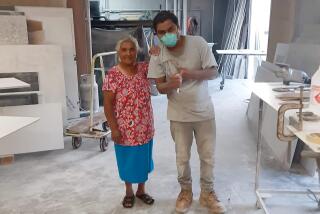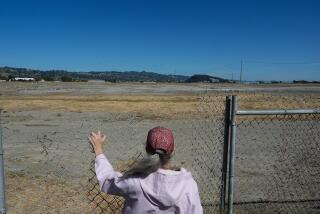Case Targets High-Tech Manufacturing
- Share via
A closely watched case challenging the high-tech industry’s image as clean and safe is scheduled to go to trial this week with two former IBM Corp. workers alleging that the computer giant covered up the risks of chemicals used in manufacturing.
James Moore and Alida Hernandez contend that they developed cancer as a result of handling dangerous chemicals over several years at IBM’s San Jose plant, where disk drives are made. Moore and Hernandez are the first of more than 200 plaintiffs suing IBM for alleged health problems to have their cases reach trial.
The stakes are high not just for the Armonk, N.Y.-based computer maker but for all of computer-related manufacturing -- particularly the $141-billion semiconductor industry.
A loss in Santa Clara Superior Court could unleash even more litigation based on evidence unearthed in the California case. The outcome also could influence cases scheduled for trial against IBM early next year, as well as suits brought by workers for National Semiconductor Corp.
“The real issue is to what extent the occupational illness can be directly linked to the chemical exposure,” said Ted Smith, executive director of a nonprofit advocacy group called the Silicon Valley Toxics Coalition. “If the allegations are found to be true by a jury, this will have many repercussions.”
IBM and the Semiconductor Industry Assn. say there is no evidence that employees in chip or component plants are more likely to develop cancer than workers in other industries.
“IBM remains right on the merits,” said Bob Weber, the company’s lead trial lawyer. “IBM did not hide things from its employees.”
IBM agreed to sell the plant to Hitachi Ltd. last year.
Although the chip manufacturing process has used a variety of confirmed and suspected carcinogens, legal and health experts say Moore and Hernandez will face a tough fight in court because of the way workers’ compensation laws are written.
To prevail, the two have to show that IBM “must have known” that the individual workers were ill and decided not to warn them that further exposure would make them worse.
IBM says its medical records show that the company’s doctors drew no such conclusions about the health of Moore and Hernandez.
Moore, 62, who made components for more than 20 years at IBM’s San Jose plant, was diagnosed with non-Hodgkin’s lymphoma in 1995. He said in legal papers that he worked with such chemicals as trichloroethylene and sulfuric acid and complained to IBM’s medical staff of symptoms including headaches, blurred vision and blackouts.
Hernandez, 73, who worked at the same facility for more than a dozen years, was diagnosed with breast cancer in 1993. She said she routinely used benzene, acetone, xylene and other chemicals, often splashing herself as she coated and cleaned surfaces. Hernandez complained to the company of headaches and blackouts.
The two filed a suit in 1998 and allege they were never warned by IBM’s staff doctors that their symptoms could reflect chemical poisoning.
“I was never even informed that they could be manifestations of poisoning of any kind, or that these symptoms had any relation to the chemicals I was working with,” Hernandez said in a court declaration. “To the contrary, I was just sent back to work.”
Two other workers whose cases were consolidated with those of Moore and Hernandez had their claims against IBM dismissed by a judge who determined there was insufficient evidence to proceed. Still, like Moore and Hernandez, they have sued IBM’s chemical suppliers as well, and those allegations will be aired during the trial, scheduled to begin Tuesday with jury selection.
A separate case filed by married co-workers at an IBM plant in Fishkill, N.Y., alleged that chemicals at the facility contributed to their son’s birth defects, which included severe facial deformities. IBM settled the suit in 2001 for an undisclosed amount.
Federal labor statistics show illnesses among chip workers to be two to three times more common than among all workers, said Dr. Joseph LaDou, a UC San Francisco professor and editor of the International Journal of Occupational and Environmental Health. But those studies include non-production workers, such as engineers and sales staff, and they don’t distinguish between cancer and minor sickness.
A few more focused studies, including one in Scotland, found evidence of significant increases in brain tumors. But because the Scottish sample was small, LaDou said, the study “lacks the reliability we would like to see.”
“The balance of evidence to date is that there’s clearly a reproductive problem, and that alerts us to the possibility of a birth defect problem,” said LaDou, who isn’t consulting in the IBM case. “In the long run, that suggests it would also be a cancer problem.”
To demonstrate a stronger link between chip making and cancer, public-health advocates say they need data from the industry. But chip makers have refused to cooperate with federally funded efforts to pin down which types of workers died from specific cancers and at what age.
George Scalise, president of the semiconductor association, said collection of such data wouldn’t be relevant, because it wouldn’t take into account family health histories and such “lifestyle issues” as smoking.
On its own, IBM has collected a vast trove of information on the health of its workers, including 30,000 death records. Last week, Santa Clara Superior Court Judge Robert Baines refused to admit as evidence a study based on those records offered by an expert for the plaintiffs, questioning its methodology and potentially prejudicial nature. Workers’ attorney Amanda Hawes said the underlying facts in the records could still come out during courtroom questioning of IBM safety officials.
“We’re looking at the issues of the corporate mortality file,” Hawes said. “There are a lot of open questions.”
For workplace safety experts, the most important outcome isn’t whether the plaintiffs win or lose, but whether the data collected by IBM will be made available for additional research.
“What’s interesting to us in the public health community is the mere existence of the corporate mortality file,” LaDou said. “We could have an instant epidemiological study.”
But if the files aren’t released in this case, they may be in future cases, said health advocate Smith.
“No matter what happens here, this won’t be the end of the story,” he said. “It’s the beginning.”






